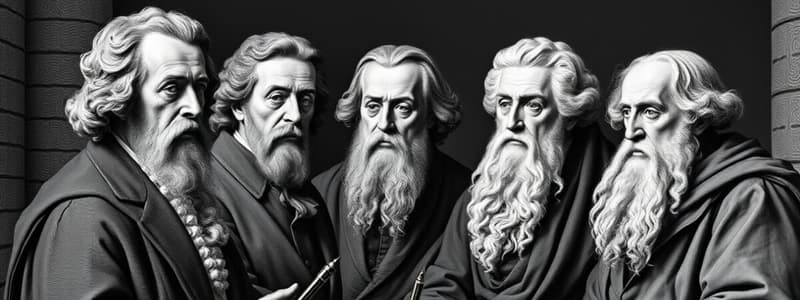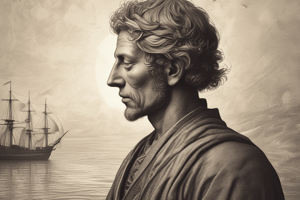Podcast
Questions and Answers
What does the Universal Declaration of Human Rights (UDHR) primarily focus on?
What does the Universal Declaration of Human Rights (UDHR) primarily focus on?
- Environmental rights
- Economic and social rights
- Civil and political rights (correct)
- Cultural rights
Which of the following treaties specifically addresses civil and political rights?
Which of the following treaties specifically addresses civil and political rights?
- International Covenant on Civil and Political Rights (correct)
- International Covenant on Economic, Social, and Cultural Rights
- Universal Declaration of Human Rights
- Convention on the Rights of the Child
Which generation of human rights emphasizes socio-economic well-being?
Which generation of human rights emphasizes socio-economic well-being?
- Third Generation
- Second Generation (correct)
- First Generation
- Environmental Rights
What is a primary characteristic of first-generation human rights?
What is a primary characteristic of first-generation human rights?
What role do human rights organizations play in contemporary society?
What role do human rights organizations play in contemporary society?
What is the focus of third-generation human rights?
What is the focus of third-generation human rights?
Which document established a comprehensive set of fundamental human rights?
Which document established a comprehensive set of fundamental human rights?
Which ancient civilization contributed to the concept of natural law and individual rights?
Which ancient civilization contributed to the concept of natural law and individual rights?
What aspect of human rights continues to evolve according to contemporary issues?
What aspect of human rights continues to evolve according to contemporary issues?
Which Enlightenment thinker is credited with the idea of the social contract?
Which Enlightenment thinker is credited with the idea of the social contract?
What year was the American Declaration of Independence signed?
What year was the American Declaration of Independence signed?
What principle is emphasized in the French Declaration of the Rights of Man and of the Citizen?
What principle is emphasized in the French Declaration of the Rights of Man and of the Citizen?
Which international organization was established in 1919 after World War I?
Which international organization was established in 1919 after World War I?
What was a major focus of the United Nations when it was founded in 1945?
What was a major focus of the United Nations when it was founded in 1945?
Which document formally articulated key rights and freedoms in the U.S. in 1791?
Which document formally articulated key rights and freedoms in the U.S. in 1791?
What major societal issue gained prominence in the 19th century alongside the movement to end slavery?
What major societal issue gained prominence in the 19th century alongside the movement to end slavery?
Flashcards are hidden until you start studying
Study Notes
Ancient Roots
- Human rights concepts originate from ancient civilizations, notably Greek and Roman philosophies.
- Thinkers such as Aristotle and Cicero discussed natural law and individual rights.
- Religious and moral codes played a significant role in the early development of human rights principles.
Enlightenment
- The Enlightenment in the 17th and 18th centuries significantly influenced modern human rights ideas.
- Notable philosophers like John Locke, Jean-Jacques Rousseau, and Thomas Paine contributed to notions of individual rights and social contracts.
American and French Revolutions
- The American Revolution (1775-1783) and French Revolution (1789-1799) led to formal political recognition of human rights.
- The American Declaration of Independence (1776) and U.S. Bill of Rights (1791) highlighted specific rights and freedoms.
- The French Declaration of the Rights of Man and of the Citizen (1789) emphasized liberty, equality, and fraternity.
19th Century Developments
- Movements to end slavery and promote women's rights gained momentum in the 19th century.
- The Geneva Conventions (1864) set humanitarian principles during armed conflicts, further establishing human rights norms.
Early 20th Century
- Post-World War I efforts included the establishment of the League of Nations in 1919, aimed at maintaining peace and promoting human rights, albeit with limited success.
- The League eventually transitioned into the United Nations.
United Nations and Universal Declaration of Human Rights
- The United Nations was founded in 1945 to advance human rights and maintain global peace.
- The Universal Declaration of Human Rights (UDHR) was adopted by the UN General Assembly in 1948, outlining fundamental human rights globally.
Subsequent Human Rights Treaties
- Various treaties and conventions followed the UDHR to specify and enforce human rights protections.
- Notable treaties include the International Covenant on Civil and Political Rights (ICCPR) and the International Covenant on Economic, Social, and Cultural Rights (ICESCR), ratified by numerous countries to establish legal obligations.
Ongoing Evolution of Human Rights
- Human rights continuously evolve in response to contemporary challenges, including technological and social changes.
- Activists, organizations, and international bodies work to address human rights violations and adapt their application.
- Human rights principles are established in international law and regarded as essential for protecting human dignity and freedoms.
Three Generations of Human Rights
- Human rights are categorized into three generations reflecting their evolution:
First Generation (Civil and Political Rights)
- Focus on individual liberties and protecting citizens from state abuses.
- Key rights include life, liberty, security, freedom of expression, religion, assembly, and fair trial.
- Central to early documents like the UDHR and ICCPR.
Second Generation (Economic, Social, and Cultural Rights)
- Emphasizes socio-economic well-being and access to essentials for a decent life.
- Rights include education, healthcare, housing, and fair working conditions.
- Associated with documents like the ICESCR, aiming for social justice and dignity.
Third Generation (Solidarity and Collective Rights)
- More recent focus on collective rights concerning global issues, although details are not fully elaborated in the provided text.
Studying That Suits You
Use AI to generate personalized quizzes and flashcards to suit your learning preferences.




